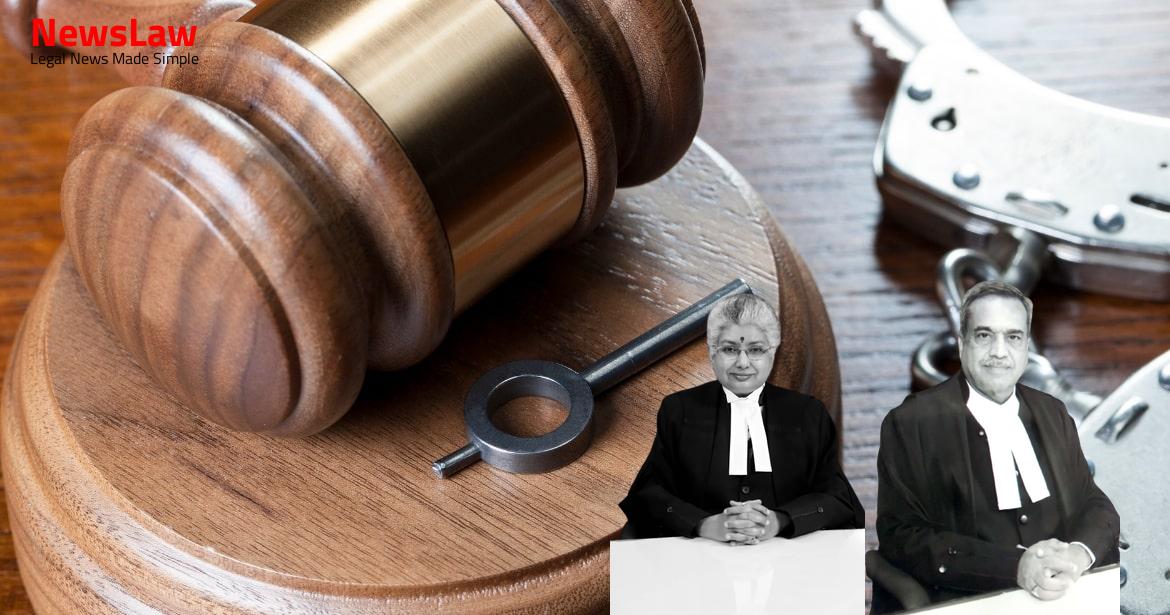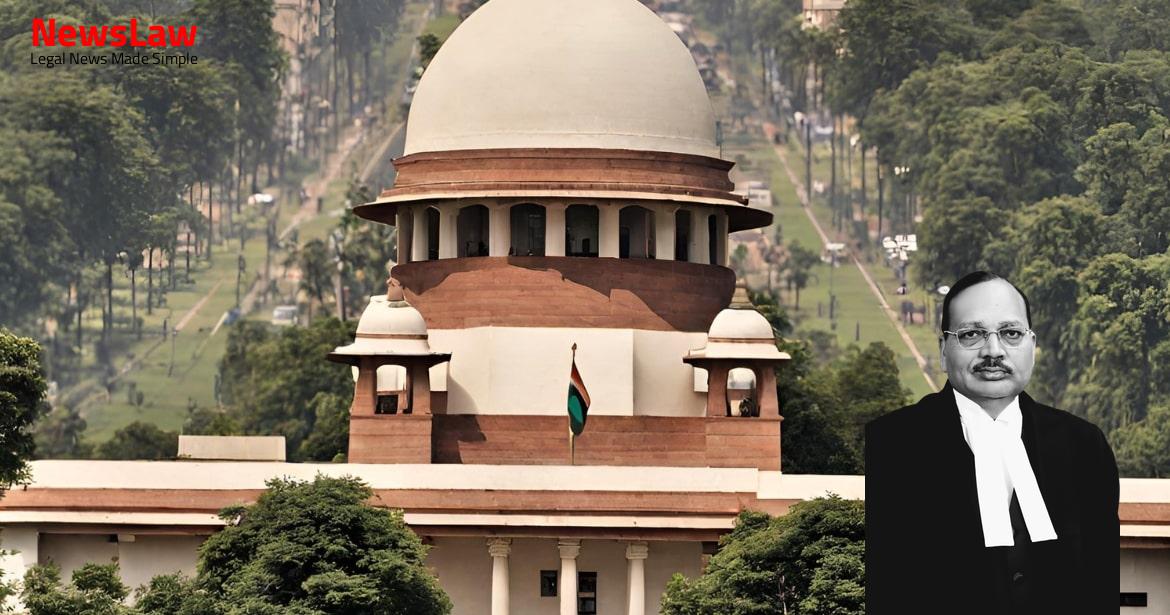Delve into the intricate legal analysis conducted by the court regarding the interpretation of an arbitration clause in a Deed of Settlement. The focus is on the application of the Arbitration and Conciliation Act, 1996, and the significance of specific language used in the agreement. The court’s thorough examination of the clause sheds light on its implications in the case at hand.
Facts
- The appellant lodged a claim before the arbitrator seeking a refund of US$ 1.5 million with 18% interest per annum from July 2011.
- The appellant filed a statement of claim before the arbitrator on 2.11.2012, outlining the breaches of the Deed of Settlement by the respondent and seeking various reliefs.
- The appellant sought orders for compensation, damages, refund of US$ 1.5 million, injunctions against the respondent, and other reliefs as deemed fit by the tribunal.
- The appellant also filed an application under Section 17 of the Arbitration & Conciliation Act seeking to attach the amount to be received by the respondent.
- The proceedings regarding this application were ultimately rejected, leading to the respondent filing a petition under Section 9 of the Act seeking directions for the escrow agent to release US$ 2 million.
- The respondent’s jurisdictional challenge against the reference under Section 16 of the Act was dismissed by the arbitrator on 17.01.2013.
- The appellant claimed that the amount should not be released to the respondent due to the breach of the Deed of Settlement.
- Respondent moved a petition under Section 34 of the Arbitration and Conciliation Act, 1996 before the Bombay High Court.
- Appellant filed for execution of the award while respondent filed for a stay of enforcement.
- Interim stay was granted on 06.04.2018 and SLP against it was dismissed.
- The learned Single Judge of the High Court set aside the award on 19.05.2020.
- Respondent’s appeal under Section 37 of the Act was dismissed by the Division Bench on 20.04.2021.
- High Court granted interim protection against withdrawal of the settlement amount for a limited period.
- In the Special Leave Petition, interim arrangement by the High Court was extended and arguments were concluded.
Also Read: Supreme Court Judgment on Single Till Mechanism for HRAB Calculation: A Comprehensive Analysis
Issue
- The issue raised before the court is the nature of the award.
Arguments
- The appellant’s argument is centered around the wording of clause 9 in the Deed of Settlement.
- Clause 9 specifies that the arbitration proceedings shall be governed by the Arbitration and Conciliation Act, 1996 of India or any amendment thereto.
- The appellant contends that this clause allows for the applicability of the Arbitration and Conciliation Act, 1996 as it stood at the time of the agreement, without any subsequent amendments affecting it.
- The appellant relies on this specific wording to support their argument in the case.
Also Read: Selection and Appointment of Judicial Officers in Himachal Pradesh
Analysis
- The Deed of Settlement between the parties was entered into on 03.01.2011 to resolve their disputes.
- The arbitration clause in the Deed of Settlement stated that it would be subject to the provisions of the Arbitration Act, 1940, or any statutory modification or re-enactment thereof.
- The clause in the Deed of Settlement cannot be interpreted as an agreement to change the legal framework of Section 34 proceedings.
- Section 26 of the 2015 Amendment Act clarified that it would not apply to arbitral proceedings commenced before its enactment, unless agreed by the parties.
- The Court found that the provision of the 2015 Amendment Act would only apply to arbitral proceedings initiated after its commencement date.
- The disputes between the parties arose from the respondent’s claim of forged signatures on placement instructions.
- The Deed of Settlement outlined steps the respondent had to take to benefit financially and resolve complaints and litigations.
- The breaches of the Deed of Settlement involved communication by the respondent’s wife, which the Court deemed inappropriate and not relevant to the settlement.
- The legal dispute focused on whether the 2015 Amendment Act should be applied retrospectively to Section 34 proceedings initiated before its enactment.
- The Court emphasized the distinction between a domestic award arising from international commercial arbitration and purely domestic awards regarding the applicability of the amendment.
- The legal principles governing the case revolved around the interpretation of relevant arbitration clauses, post-amendment scrutiny, and the consequences of the award on the parties.
- The Court clarified that the parties had not agreed for the 2015 Amendment Act provisions to apply to their arbitral proceedings initiated before its enactment.
- The appellant agreed not to write any letters/complaints to police or judicial authorities or entities regarding the subject matter of the Deed.
- A monetary incentive of US$ 1.5 million was to be paid to the respondent, to be held in escrow until the appellant withdrew his complaint as confirmed by the EOW.
- The appellant claims the award is from an international commercial arbitration based on the definition provided in Section 2(1)(f) of the Arbitration and Conciliation Act.
- An additional US$ 2 million was to be paid to the respondent upon the sale of MSM’s shares.
- Clause 6 of the Deed specified consequences for breaching the agreement, including termination of the Deed and release of the US$ 1.5 million held in escrow back to the appellant.
- The criteria for an award being in conflict with the public policy of India were outlined in clause 3, with specific conditions for fraud, contravention of Indian law, and morality or justice.
- Disputes between the parties were to be referred to arbitration by a single arbitrator as per clause 9 of the Deed.
- In the case of Ssangyong Engineering and Construction Company Ltd. v. National Highways Authority of India, the pre-amendment position regarding the expression ‘in conflict with public policy of India’ was discussed, referencing the judgment in Associated Builders v. Delhi Development Authority.
- Section 26 of the 2015 Amendment Act was highlighted in the Board of Control for Cricket in India v. Kochi Cricket Pvt. Ltd. & Ors., emphasizing the division of proceedings into arbitral proceedings and court proceedings.
- The judgment emphasized that the 2015 Amendment Act is prospective and applies to arbitral proceedings commenced after the Act came into force, along with court proceedings initiated post the Act’s commencement.
- It was clarified in Ssangyong Engineering and Construction Company Ltd. v. National Highways Authority of India that the amended Section 34 will apply only to applications made to the Court after a specific date, regardless of when the arbitration proceedings began.
- The Supreme Court’s interpretation of ‘public policy’ in the context of setting aside arbitral awards was discussed, highlighting instances where a decision may be deemed perverse based on the lack of evidence, consideration of irrelevant factors, or omission of vital evidence.
- Furthermore, the expansion of the phrase ‘public policy of India’ in Section 34 of the 1996 Act was explained through various judgments, emphasizing the fairness, reasonableness, and objectivity expected in decisions as well as the fundamental principles of Indian law.
- A distinction was drawn between purely domestic awards and those arising from international commercial arbitrations concerning the setting aside of awards based on patent illegality, with specific guidelines mentioned in the sections of the Arbitration and Conciliation Act.
- A learned single Judge of the Delhi High Court in ABB India Ltd. v. Bharat Heavy Electricals Ltd. referred to the judgment in Parmar Construction Company case while making observations.
- The appellant cited two judgments of the Bombay High Court in Padmini Chandran Menon v. Vijay Chandran Menon and Board of Trustees of the Port of Mumbai v. Afcons Infrastructure Limited, which rely on Thyssen Stahlunion Gmbh.
- General observations in the case mentioned may not help the appellant due to conflicting judicial pronouncements by the Supreme Court on a similar issue.
- In S.P. Singla Constructions Pvt. Ltd. v. State of Himachal Pradesh & Anr., the specific part of the judgement referred to certain judicial pronouncements by the Court.
- Clause 6 of the Deed of Settlement could not be relied on to award liquidated damages in favour of the appellant.
- The observations of the Single Judge and Division Bench support this position.
- Both the learned Single Judge and Division Bench agreed that the award could not stand, regardless of the application of pre or post-amendment provisions.
Decision
- Appeal dismissed with costs.
- Deed of Settlement includes an arbitration clause in clause 9.
- Arbitration proceedings to be governed by the Arbitration and Conciliation Act, 1996 of India or any amendment thereto.
Case Title: RATNAM SUDESH IYER Vs. JACKIE KAKUBHAI SHROFF (2021 INSC 712)
Case Number: C.A. No.-006112-006112 / 2021



